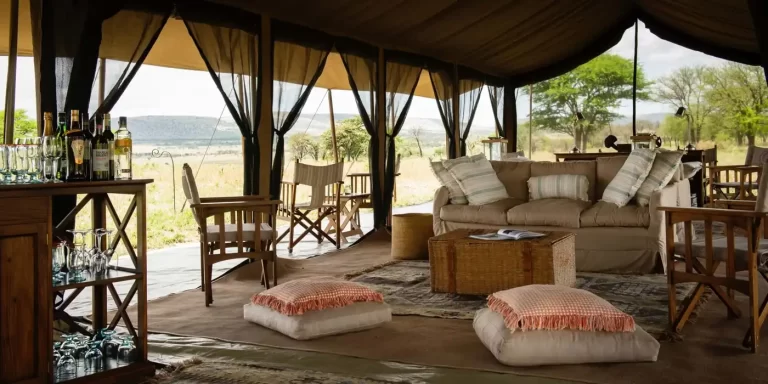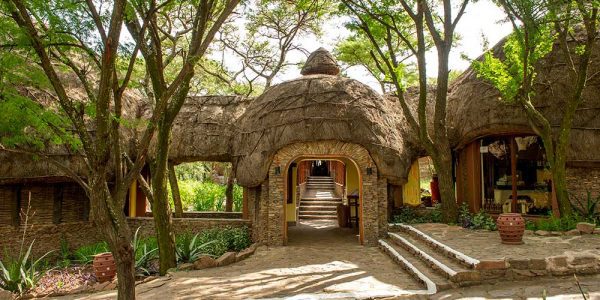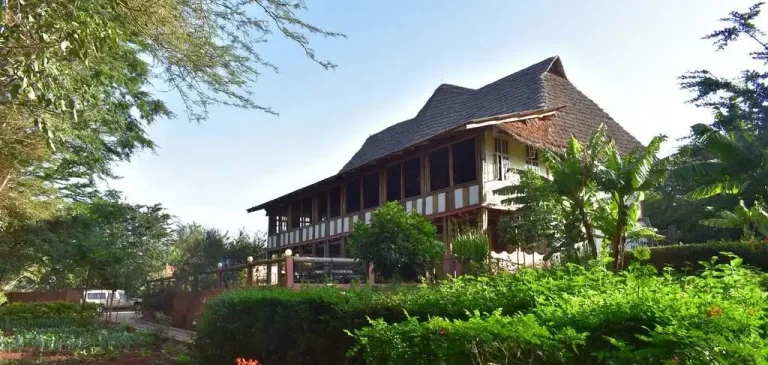
15 Dec 5 Types of Tanzania Safari Accommodations
5 Types of Tanzania Safari Accommodations: Where to Stay?
When planning your Tanzanian safari adventure, choosing the right accommodation is crucial to enhance your overall experience. Here are the key factors to consider:
(A) Budget: Determine your overall safari budget before selecting accommodations. Tanzania offers options ranging from USD 80 to over USD 1500 per person per night (excluding other fees). Align your accommodation choices with your budget and preferences.
(B) Location: Prioritize the location of your accommodation over the type. Opt for accommodations situated near parks for maximum wildlife viewing time.
(C) Type of Accommodation: Tanzania offers various accommodation types, from budget camping to mid-tier and luxury lodges, tented camps, and tented lodges. Choose based on budget, interests, itinerary, and comfort level.
Now, let’s explore the five types of safari accommodations available in Tanzania:

1. Lodges
Safari lodges are substantial structures, often constructed from concrete, positioned either within or on the outskirts of national parks. These lodges seamlessly blend various materials like stone, thatch, and wood, harmonizing with their natural surroundings.
Safari lodges typically sprawl across extensive grounds, featuring a central communal building that houses amenities such as a reception area, lounge, restaurant, bar, and sometimes even a gym, spa services, and shops. Many lodges boast a main block with a swimming pool, offering guests relaxation opportunities after their thrilling game drives.
The majority of lodges ensure uninterrupted electricity supply throughout the night and provide essential facilities such as running water, laundry services, Wi-Fi (often limited to reception areas), hair dryers (available upon request), and secure locker facilities.
Safari lodges span a spectrum from mid-tier to luxury options.
Luxury lodges pamper guests with lavish amenities, including four-poster beds, expansive wraparound balconies affording breathtaking vistas, elegant bathrooms, spacious rooms, and, in some cases, private plunge pools and air conditioning.
Recommended for: Safari lodges are perfect for clients seeking amenities such as on-site restaurants, swimming pools, and spa services. Families traveling with children and larger groups looking for spacious accommodations with ample activities for kids will find lodges an appealing option.
Not Recommended for: Clients in search of a more rustic and immersive safari adventure may find lodges too formal and disconnected from the natural environment. Lodges tend to be larger and busier than other accommodation types, making them less suitable for those seeking a secluded and intimate experience. Additionally, clients on a tight budget might find lodges cost-prohibitive compared to other lodging options.

2. Tented Lodges
Tented lodges aim to offer the best of both worlds, providing guests with many of the comforts found in traditional lodges while immersing them in nature through canvas walls. These lodges typically feature wooden or sometimes concrete floors, elevated on stilts, and topped with thatched roofs. The walls consist of canvas with large netted windows, creating a connection with the outdoors. These are permanent structures, and many tented lodges include swimming pools.
Usually accommodating between 15 to 25 rooms (tents), tented lodges space them out, with a central common area. This communal space often includes a dining room, lounge, small terrace, and, in many cases, a swimming pool. Guests can expect breathtaking views of the savannah.
Like traditional lodges, tented lodges cater to a range of clients, from mid-tier to luxury.
Luxury tented lodges may offer additional amenities such as indoor or outdoor bathtubs, plunge pools, air conditioning, spacious viewing decks, spa services, and even large glass panels in the walls. Many tented lodges offer varying room sizes to accommodate groups or families. Their menus are designed to appeal to tourists from around the world.

Recommended for: Tented lodges are a fantastic choice for clients seeking an authentic and immersive safari experience without compromising on comfort and luxury. They suit those who wish to relish vast savannah vistas, immerse themselves in the sounds and sights of wildlife just beyond their tent, and experience a unique accommodation style not found at home.
Not recommended for: Tented lodges may not be suitable for guests with limited mobility, as accessing accommodations or dining areas may require walking or climbing stairs. While the tents are typically well-appointed and comfortable, they are not soundproof, allowing guests to hear the natural sounds of the environment or their neighbors’ activities. If the idea of hearing lions or hyenas during the night, separated only by a canvas wall, is unsettling, you may prefer traditional lodges. Additionally, tented lodges may not be the best choice for families traveling with young children, as extra care is needed to ensure their safety in a wild setting.

3. Tented Camps
Tented camps, distinct from basic camps, reign as the most sought-after accommodation within Tanzania’s national parks. These comfortable walk-in tents, crafted entirely from canvas, provide a unique blend of convenience and a genuine connection with nature. Their size often mirrors that of an average hotel room, if not larger, and boasts private ensuite bathrooms equipped with either bucket or running showers, long-drop or flush toilets, and solid beds featuring plush mattresses. Guests can also enjoy outdoor relaxation with chairs and a table outside their tent.
Some tented camps, primarily located in Central Serengeti and Tarangire, maintain a permanent presence throughout the year. Others opt for mobility, relocating based on anticipated wildlife migration patterns—moving from the southern Serengeti/Ndutu region from December to March to the northern Serengeti between June and October.
Typically powered by solar energy with diesel generators for backup, most tented camps cut off electricity during the night, typically from 10:00 PM to 5:00 AM. As a result, charging electronic devices within your tent may not be feasible, necessitating the use of charging ports in the camp’s common area. Alternatively, you can charge your devices in the safari vehicle. Expect limited or no Wi-Fi access in these camps, although some may offer it in common areas.
All meals are served in a restaurant tent, prepared by skilled chefs. Guests can choose from a variety of available drinks and bask in the warmth of a bonfire under the open sky. Given that tented camps are unfenced and nestled within the wild, guests are strongly advised against venturing outside their tents after dark. A guard typically escorts guests from the common area to their tents at sunset and before sunrise.

Tented camps come in various comfort levels, ranging from fairly basic to lavishly decorated and upscale options that can rival luxury lodges in terms of cost.
One of the standout advantages of a tented camp stay is the proximity to nature. Falling asleep to the sounds of wildlife and waking up to animals grazing nearby is an unforgettable experience. Tented camps often feature communal areas where guests can relax, socialize, and savor meals crafted by expert chefs. These camps tend to be less crowded, typically offering only about 8-12 tents, making them one of the most tranquil accommodation choices on safari.
Recommended for: Tented camps are an ideal choice for travelers seeking an immersive and authentic Tanzanian safari experience. Those who relish being close to nature, hearing the sounds and sights of wildlife up close, and those desiring a smaller, more rustic, and adventurous accommodation will find tented camps to be the perfect fit.
Not recommended for: Tented camps tend to offer a more basic experience compared to traditional lodges or even tented lodges. Guests should be prepared for a rustic setting and limited access to electricity and internet connectivity. Families with young children or those with mobility issues may find some tented camps less suitable due to uneven terrain. If the idea of hearing lions and hyenas throughout the night, with only a canvas wall separating you from the wilderness, is disconcerting, then lodges might be a more suitable choice. Tented camps may also not be the best option for clients traveling with young children, as careful supervision is essential to ensure their safety in the wild surroundings.

4. Budget or Basic Camping
Budget or basic camping is tailored for adventurous travelers seeking an economical safari experience. Here’s what to expect:
- Accommodations: You’ll set up a tent at a designated campsite, sleeping in a sleeping bag on a foam mattress placed directly on the ground. Toilet and shower facilities are typically shared.
- Camping Gear: As part of your package, you’ll be provided with essential camping gear, including a tent, sleeping bag, foam mattress, pillow, foldable chairs, and a table.
- Meals: While you’re out on a game drive, your camp cook remains at the campsite to prepare your meals. You’ll receive three daily meals, although the variety may be limited because the cook relies on initial supplies from Arusha. Most campsites feature a communal kitchen shared by the cooks serving tourists. For snacks or alcohol, you’ll need to purchase them from stores in town while en route to the campsite.
- Location: Campsites are typically situated inside the national parks, although in some areas like Manyara, campsites outside the park are more common.
- Amenities: Campsite facilities include shared common washrooms, which may not be as clean as private washrooms in other accommodations. Hot water availability can be limited. To charge your devices, you’ll need to utilize the ports in your safari vehicle during game drives.

Recommended for: Basic camping is an ideal choice for travelers comfortable with minimal amenities and eager to experience Tanzania’s natural beauty on a budget. It suits physically fit individuals with some camping experience.
Not recommended for: Travelers who prioritize comfort, have limited mobility, or travel with young children should consider alternative accommodations. Additionally, during the dry season (June to October), campsites can become crowded and somewhat noisy.

5. City-Based Hotels and Lodges
In addition to the four previously mentioned accommodation types nestled within or around Tanzania’s national parks, you have the option to stay in city-based hotels and lodges during specific segments of your safari itinerary. These urban lodgings can be found in towns and cities close to the national parks, including Arusha City and Karatu Town.
Budget-friendly city hotels often offer the most economical rates among all the accommodation options discussed here, sometimes even surpassing the affordability of basic camping. Depending on your travel plan, these accommodations may be strategically located to minimize transfer times. For instance, Karatu hotels are conveniently positioned for overnight stays between Tarangire and Ngorongoro/Serengeti or between Manyara and Ngorongoro/Serengeti.
Nevertheless, it’s important to note a significant drawback of city hotels and lodges: they lack the wilderness ambiance that immerses you in nature’s heart.

To save on expenses, travelers often opt for Karatu-based hotels during the night between Serengeti and Ngorongoro, adding approximately 1 to 1.5 hours to their overall transfer time. If your budget permits, consider staying within Ngorongoro itself for this night to reduce travel time and relish the distinctive accommodation options unique to Tanzania’s national parks, unavailable elsewhere in Africa. Alternatively, high-end lodges can be found in towns like Karatu and Arusha, nestled amidst lush plantations, providing scenic vistas of farmlands, plantations, or nearby forests.
Recommended for: City hotels and lodges are an excellent choice for budget-conscious travelers, those with itineraries accommodating two consecutive nights in Karatu (e.g., 3-day Manyara, Ngorongoro, Tarangire trips), visitors exploring Arusha National Park, and those requiring accommodations in Arusha before or after their safari due to flight schedules. They also cater to families with children and larger groups seeking spacious lodging options.
Not recommended for: Travelers seeking a genuine wilderness experience immersed in nature’s beauty may find city hotels and lodges, particularly those in Karatu, to be too formal or disconnected from the untamed environment, lacking the adventurous and authentic feel they desire.


